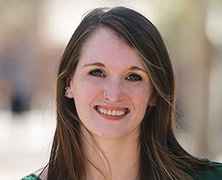My Experience in STEM
When I started my career in nuclear security more than six years ago, I was one of only a handful of women in my department. I was fortunate to find several key mentors—women and men—that have helped me find my voice and build on opportunities. I have had to work hard to prove to others, and to myself, that I can lead teams and establish new processes that benefit domestic and international nuclear security. While it hasn’t always been easy, I have learned from every challenge. I hope that I will have the opportunity to be a mentor and help more young women establish themselves in this important field.
The Changing World of STEM
I work in international nuclear security, where STEM education is critical to creating new technologies that make the world a safer and more secure place. New types of nuclear technology to power our homes and businesses, cybersecurity to keep the power grid safe from attackers, systems to prevent the theft of nuclear materials and sabotage of nuclear facilities from outside and insider threats—all of these nuclear security related-fields will grow in the next ten years, and all of them require advanced STEM education. I would encourage young women who want to begin a rewarding career that makes a global difference to explore STEM field in nuclear security.
Women in STEM 5 Years Down the Road
In five years, I hope to see more women in executive-level roles in nuclear security, and in all STEM industries. Currently, women are making tremendous headway into STEM careers, especially in the early- to mid-level jobs, but I think we could use more women at the top. One of my inspirations is Jill Hruby, who previously served as Director of Sandia National Laboratories, and is now serving as the Under Secretary for Nuclear Security of the U.S. Department of Energy (DOE) and Administrator of the National Nuclear Security Administration. She is helping to open doors and to motivate women scientists and technologists across the country.
Also, I hope that organizations like Gender Champions in Nuclear Policy, which is sponsored by our current Labs Director James Peery here at Sandia, will help break down barriers women face when entering the nuclear security field. I am encouraged by both the national and local support women receive.







